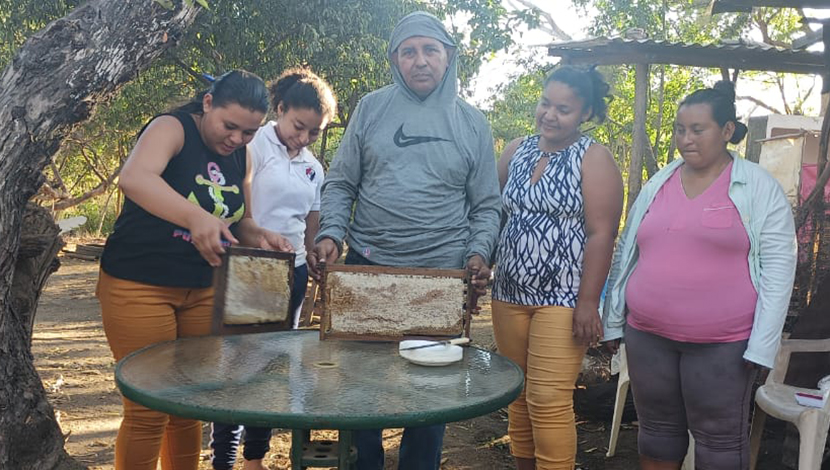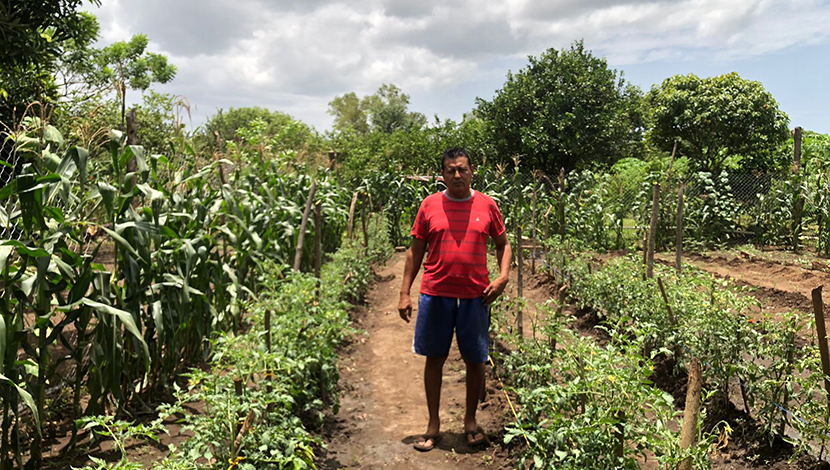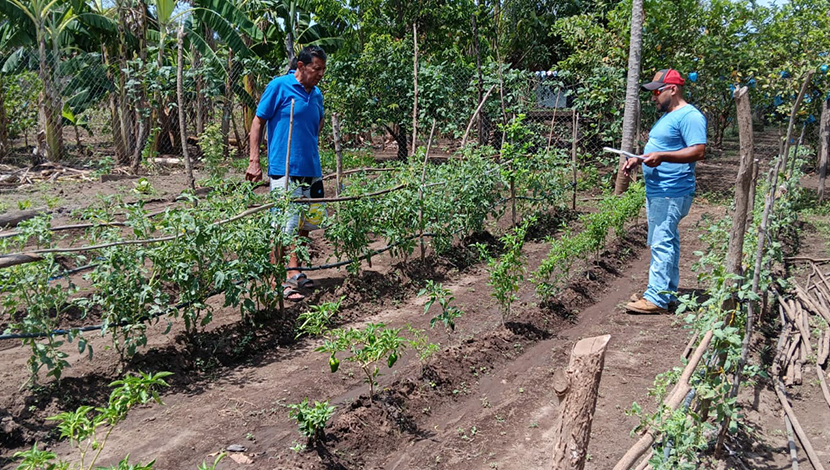
Troilo community, Sutiava León, Nicaragua
My name is Juan Berrios, I live with my wife and daughter Gabriela in Troilo, Sutiava León, Nicaragua. I am 54 years old. Two years ago I graduated from the ViviendasLeón Human Training program and after completing the training I was provided with materials for our family garden. That same year my daughter Gabriela was given a school scholarship, and in 2023 I joined the Troilo Bee Collective, AMHOR.
I have always liked to work the land. As a child I worked as a day laborer in the sugar cane fields. I worked under the incessant sun in the hottest hours of the day from seven in the morning to midday and sometimes until three in the afternoon to be able to bring a little money home. I suffered from dehydration. I did not want to continue with that life for myself, but I did not have my own resources to work on my own, until I said: “I am going to grow vegetables in my house” and I decided to be a small farmer. I grew corn, cassava, pipián, guava and squash, which are the traditional crops that I could plant on open ground. I did not have fencing and domestic animals often damaged my harvest.

After receiving agricultural technical training from ViviendasLeón I began to produce more diverse crops. Now I grow tomatoes, bell peppers, carrots, yellow and red onions, cucumbers, papayas, chives, celery, calala, radishes, beets and pole beans. I also have a palisade of guavas, jamaica, Creole lemons, and lemon lime, which I produce and sell almost all year round.
Starting in October of 2024, I started participating in the Bee Project called Abejas, Miel and Hortalizas from my land or (AMHOR) from my land. I signed up for the project because I always wanted to work with bees, but did not have the opportunity to learn from someone in Troilo. AMHOR was my chance to learn how to work with bees.
Also in 2024 I became sick. After some tests I was diagnosed with Chronic Kidney Failure. I didn’t let it become an obstacle to participating in the program. I spoke with Brenda from ViviendasLeón and explained my situation. I called the AMHOR group together and we reached an agreement to hold technical visits coordinated to work around my therapies. Our group has been very understanding, and the visits to the apiary are made when there is not much sun so as not to affect my health. Today I am trained in caring for bees. I am a Beekeeper and it fills me with joy to have fulfilled my dream. In March we had our first honey harvest.

With all the benefits that ViviendasLeón has provided me, my life has improved considerably, not only nutritionally, but also economically, and emotionally. Now even when I am sick I feel useful. Being the keeper of my garden and one of the owners of the apiary has been very helpful in improving the quality of life for my family.
Currently I am also producing vegetables including radish, beet and spinach, which have many nutrients and iron to counteract the anemia resulting from the disease. When mixed with cucumbers, celery and lemon I have developed home remedies that help me control the sugar levels in my body, as well as detoxify my kidneys. With tomatoes we make delicious salads that are rich in vitamin C and antioxidants. With Pole Beans we make eggs with the pods for breakfast, which is also very rich in iron.
All these nutritional contributions help me to have a balanced, healthy life. I don’t buy medicines or drinks with chemicals because in my family we use and combine vegetables to make smoothies and home remedies that improve our nutrition and quality of life.
Chronic Kidney Disease
The World Health Organization (WHO) has classified Chronic Kidney Disease as an international pandemic because many people suffer from this disease at an early age. It is estimated that Chronic Kidney Disease has a high incidence and prevalence globally, and that almost half of the patients are young people and even children who must undergo hemodialysis and kidney transplants to stay alive. Risk factors for the disease include high blood pressure and diabetes, both are common in Nicaragua and other countries ranked as having low levels of development.
In Nicaragua, Chronic Kidney Disease occupies fifth place among the top ten causes of death, according to the Nicaraguan Institute of Chronic Kidney Disease. Evidence shows that in Nicaragua it affects a younger population, predominantly male in their most productive time of life. Rates of the disease have been increasing in the last 10 years. Rates of morbidity and mortality are now from 40 to 50 deaths per month (500 deaths annually), with a concentration in the departments of León and Chinandega.

